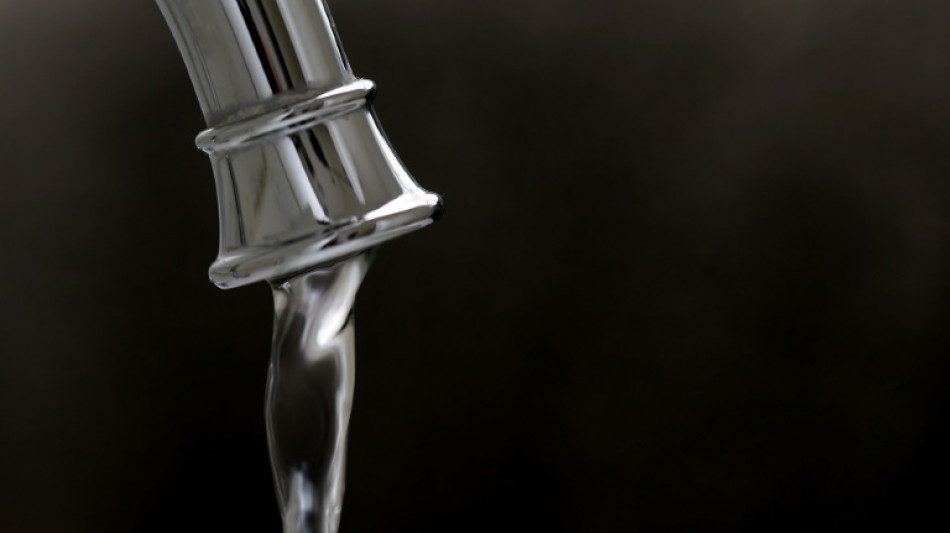
-
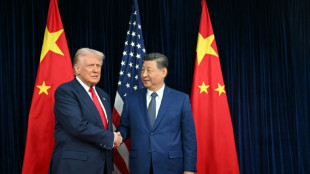 Asia markets fluctuate as investors mull Trump-Xi talks
Asia markets fluctuate as investors mull Trump-Xi talks
-
Trump, Xi ease fight on tariffs, rare earths
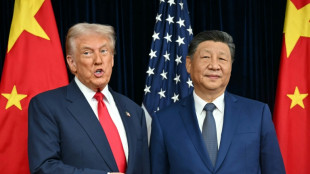
-
 Volkswagen posts 1-billion-euro loss on tariffs, Porsche woes
Volkswagen posts 1-billion-euro loss on tariffs, Porsche woes
-
'Fight fire with fire': California mulls skewing electoral map

-
 Fentanyl, beans and Ukraine: Trump hails 'success' in talks with Xi
Fentanyl, beans and Ukraine: Trump hails 'success' in talks with Xi
-
'Nowhere to sleep': Melissa upends life for Jamaicans

-
 Irish octogenarian enjoys new lease on life making harps
Irish octogenarian enjoys new lease on life making harps
-
Tanzania blackout after election chaos, deaths feared

-
 G7 meets on countering China's critical mineral dominance
G7 meets on countering China's critical mineral dominance
-
Trump hails tariff, rare earth deal with Xi
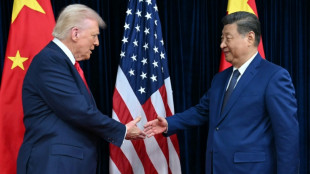
-
 Court rules against K-pop group NewJeans in label dispute
Court rules against K-pop group NewJeans in label dispute
-
India's Iyer says 'getting better by the day' after lacerated spleen

-
 Yesavage fairytale carries Blue Jays to World Series brink
Yesavage fairytale carries Blue Jays to World Series brink
-
Bank of Japan keeps interest rates unchanged

-
 Impoverished Filipinos forge a life among the tombstones
Impoverished Filipinos forge a life among the tombstones
-
Jokic posts fourth straight triple-double as Nuggets rout Pelicans

-
 UN calls for end to Sudan siege after mass hospital killings
UN calls for end to Sudan siege after mass hospital killings
-
Teenage Australian cricketer dies after being hit by ball

-
 As Russia advances on Kupiansk, Ukrainians fear second occupation
As Russia advances on Kupiansk, Ukrainians fear second occupation
-
Trade truce in balance as Trump meets 'tough negotiator' Xi

-
 China to send youngest astronaut, mice on space mission this week
China to send youngest astronaut, mice on space mission this week
-
Yesavage gem carries Blue Jays to brink of World Series as Dodgers downed

-
 With inflation under control, ECB to hold rates steady again
With inflation under control, ECB to hold rates steady again
-
Asia stocks muted with all eyes on Trump-Xi meeting

-
 Personal tipping points: Four people share their climate journeys
Personal tipping points: Four people share their climate journeys
-
Moto3 rider Dettwiler 'no longer critical' after crash: family

-
 US economy in the dark as government shutdown cuts off crucial data
US economy in the dark as government shutdown cuts off crucial data
-
Trump orders nuclear testing resumption ahead of Xi talks

-
 'Utter madness': NZ farmers agree dairy sale to French group
'Utter madness': NZ farmers agree dairy sale to French group
-
Samsung posts 32% profit rise on-year in third quarter

-
 30 years after cliffhanger vote, Quebec separatists voice hope for independence
30 years after cliffhanger vote, Quebec separatists voice hope for independence
-
Taxes, labor laws, pensions: what Milei wants to do next

-
 South Sudan's blind football team dreams of Paralympic glory
South Sudan's blind football team dreams of Paralympic glory
-
US says 4 killed in new strike on alleged Pacific drug boat
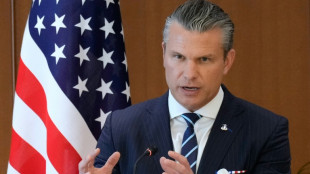
-
 What we do and don't know about Rio's deadly police raid
What we do and don't know about Rio's deadly police raid
-
'They slit my son's throat' says mother of teen killed in Rio police raid

-
 Arteta hails 'special' Dowman after 15-year-old makes historic Arsenal start
Arteta hails 'special' Dowman after 15-year-old makes historic Arsenal start
-
Google parent Alphabet posts first $100 bn quarter as AI fuels growth
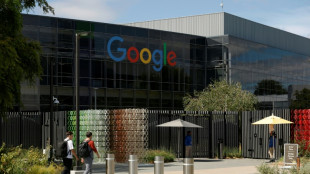
-
 Underwater 'human habitat' aims to allow researchers to make weeklong dives
Underwater 'human habitat' aims to allow researchers to make weeklong dives
-
Maresca slams Delap for 'stupid' red card in Chelsea win at Wolves

-
 'Non-interventionist' Trump flexes muscles in Latin America
'Non-interventionist' Trump flexes muscles in Latin America
-
Slot defends League Cup selection despite not meeting 'Liverpool standards'

-
 'Poor' PSG retain Ligue 1 lead despite stalemate and Doue injury
'Poor' PSG retain Ligue 1 lead despite stalemate and Doue injury
-
Liverpool crisis mounts after League Cup exit against Palace

-
 Kane scores twice as Bayern set European wins record
Kane scores twice as Bayern set European wins record
-
Radio Free Asia suspends operations after Trump cuts and shutdown

-
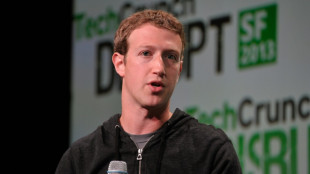 Meta shares sink as $16 bn US tax charge tanks profit
Meta shares sink as $16 bn US tax charge tanks profit
-
Dollar rises after Fed chair says December rate cut not a given
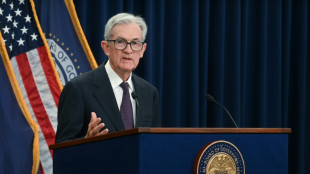
-
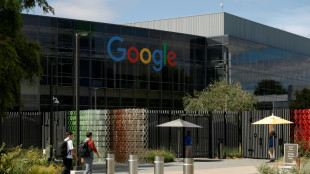 Google parent Alphabet posts first $100 bn quarter as AI drives growth
Google parent Alphabet posts first $100 bn quarter as AI drives growth
-
Rob Jetten: ex-athlete setting the pace in Dutch politics
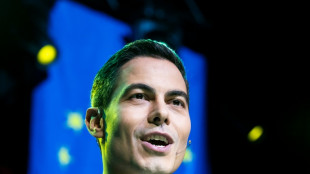

Utah becomes first US state to ban fluoride in drinking water
The western US state of Utah has become the first to prohibit fluoridation of its public drinking water, part of a growing movement reexamining the decades-old public health practice.
New US Health Secretary Robert F. Kennedy Jr. has long been a vocal critic of fluoridated water, which currently reaches an estimated 200 million Americans -- about two-thirds of the population.
Utah's ban, signed into law by Governor Spencer Cox on Thursday, is set to take effect on May 7. Legislatures in other Republican-led states including North Dakota, Tennessee, and Montana, are considering similar measures.
Opposition is not limited to red states. Liberal-leaning cities such as Portland, Oregon, and the City and County of Honolulu, Hawaii, have also banned fluoridation.
Fluoride was first introduced to US water systems in 1945, dramatically reducing childhood cavities and adult tooth loss. The Centers for Disease Control and Prevention hails it as one of the top public health achievements of the 20th century.
But controversy has grown around its potential neurotoxic effects. Last year, the Department of Health and Human Services under former president Joe Biden concluded with "moderate confidence" that higher levels of fluoride are linked to lower IQ scores.
This January, a paper in the prestigious journal JAMA Pediatrics, authored by the same government scientists, found a "statistically significant association" between fluoride exposure and reduced IQ. However, it left open key questions about what dosage levels may be harmful.
The World Health Organization's safety threshold stands at 1.5 milligrams per liter -- about double the US guideline of 0.7 mg/L -- and the study said there was insufficient data to determine whether that limit should be revised.
Ending fluoridation is generally opposed by the dental and public health communities. Critics of the recent study argue it failed to adequately control for confounding variables and environmental factors.
Fluoride occurs naturally in varying concentrations and strengthens teeth in several ways: by restoring minerals lost to acid, reducing acid production by cavity-causing bacteria, and making it harder for those bacteria to adhere to enamel.
Proponents argue fluoridation reduces socioeconomic disparities in dental care.
But with fluoride toothpastes widely available since the 1960s, some research suggests diminishing returns.
A recent Canadian study found that ending fluoridation increased dental caries, while an Irish study reported a decline in severe caries in both fluoridated and non-fluoridated areas.
Fluoridation policies also vary widely by country, with many, including Germany and France eschewing the practice altogether.
J.Sauter--VB




